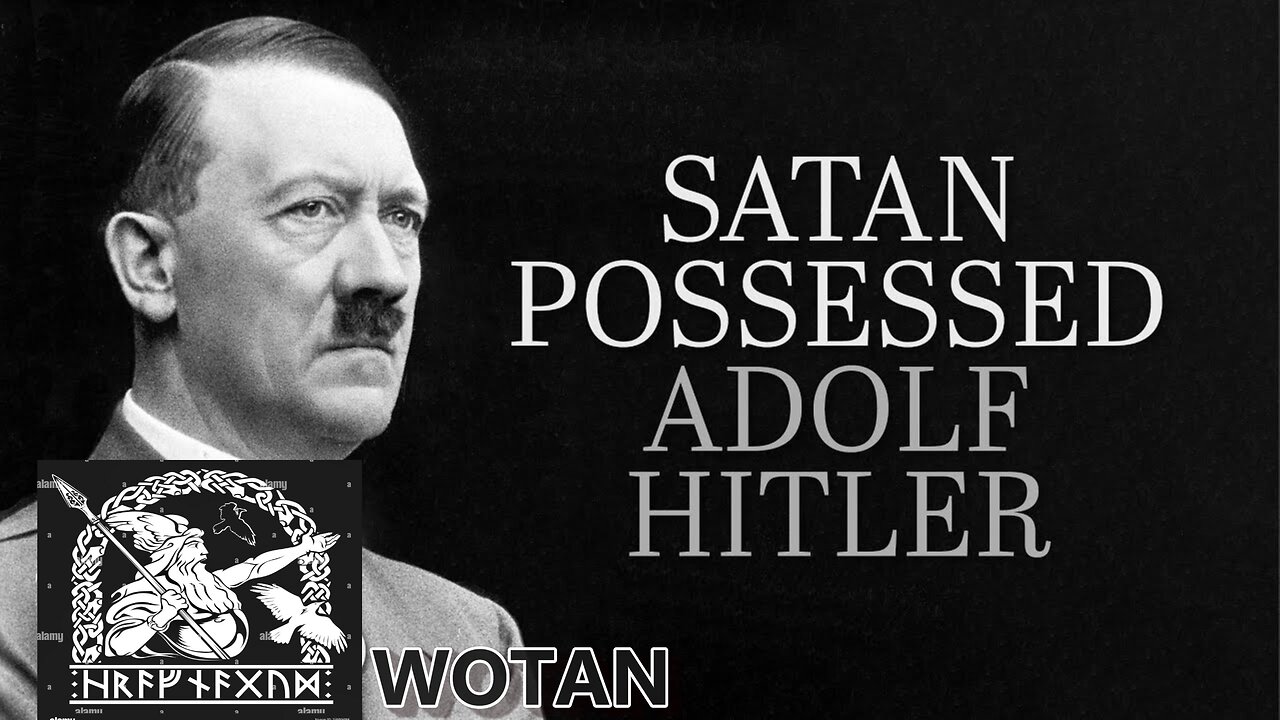Premium Only Content

The Hero of Muslims, Adolf Hitler Was Satanically Possessed – His Eyes Tell Everything
💭 Carl Jung on Hitler
Carl Jung, the famed Swiss psychiatrist and founder of analytical psychology, led a fascinating life that included a little-known period working with the American Office of Strategic Services (OSS), the intelligence agency that later became the CIA, during World War II. At the request of the OSS, Jung developed psychological profiles of Adolf Hitler and other Nazi leaders in an effort to better understand the fascist mindset.
In his fascinating essay, 'Wotan', Carl Jung demonstrates his concept of the archetype by likening the National Socialist movement in Germany to possession by the Germanic god Wotan.
Carl Jung, watching from across Germany’s southern border in Switzerland, was fascinated by these developments. In Wotan, he describes how many others had attempted to explain Hitler’s rise in economic terms, or by reference to mundane psychological or political theories, but that each of these perspectives left something to be desired. Jung offers a different view—as thinkers like Friedrich Nietzsche had already foreseen, the German crisis of the 1930s was a spiritual crisis, one that could best be described as a reawakening of the German soul in the form of the old Germanic god Wotan.
Who is Wotan? In Jung’s words:
“Wotan is a restless wanderer who creates unrest and stirs up strife, now here, now there, and works magic…
He is the god of storm and frenzy, the unleasher of passions and the lust of battle; moreover he is a superlative magician and artist in illusion who is versed in all secrets of an occult nature.”
Carl Jung's description of Adolf Hitler as the "shadow" of the German people refers to his concept of the "shadow" in analytical psychology. The shadow represents the unconscious parts of the personality that individuals tend to reject or ignore, often encompassing traits that are socially undesirable or morally unacceptable. Jung believed that the shadow contains both personal and collective elements, including repressed feelings, instincts, and desires.
When Jung called Hitler the shadow of the German people, he was suggesting that Hitler embodied the darker, unacknowledged aspects of the German psyche. This perspective implies that the rise of Nazism and the acceptance of Hitler by many Germans were reflections of underlying fears, resentments, and aggressive tendencies within the society that had not been properly addressed or integrated. Jung argued that the collective shadow, when unrecognized, can manifest in destructive ways, leading to societal horrors, as seen in the atrocities of the Nazi regime.
In summary, Jung's characterization of Hitler highlights the importance of recognizing and integrating the darker aspects of the human experience, both individually and collectively, to avoid the dangers of repression and the potential for societal violence.
👉 Here is a link to the essay called Wotan, an essay Jung wrote about Hitler and how he embodied the old northern god Wotan. https://carljungdepthpsychologysite.blog/2020/11/09/essay-on-wotan-by-dr-carl-jung/#.Yyn8aoh5M_1
-
 LIVE
LIVE
The Tom Renz Show
55 minutes agoWho Is Undermining Trump?
94 watching -
 1:00:55
1:00:55
Mark Kaye
4 hours ago🔴 Trump Tells Tech Tycoons It's Time To Pay Up!
10.7K4 -
 LIVE
LIVE
Right Side Broadcasting Network
6 hours agoLIVE: President Trump Makes an Announcement - 9/5/25
4,930 watching -
 LIVE
LIVE
SportsPicks
3 hours agoCrick's Corner: Episode 77
324 watching -
 1:06:02
1:06:02
LindellTV
2 hours agoBREAKING: FBI Returns Mike Lindell’s Cellphone
12.1K8 -
 1:04:31
1:04:31
Jeff Ahern
1 hour agoFriday Freak out with Jeff Ahern
2.76K -
 7:33
7:33
Talk Nerdy Sports - The Ultimate Sports Betting Podcast
5 hours agoFriday Night Lights in BRAZIL 🇧🇷🔥🏈
1.76K -
 LIVE
LIVE
Reidboyy
2 hours ago $0.41 earned$20 Billion Dollar Warzone Tournament! Protect The President
51 watching -
 1:15:26
1:15:26
Tucker Carlson
4 hours agoWhistleblower Exposes the Real Puppet Masters Controlling the State Department and Plans for Gaza
54.9K47 -
 LIVE
LIVE
StoneMountain64
3 hours agoHelldivers 2 just KEEPS GETTING BETTER
43 watching